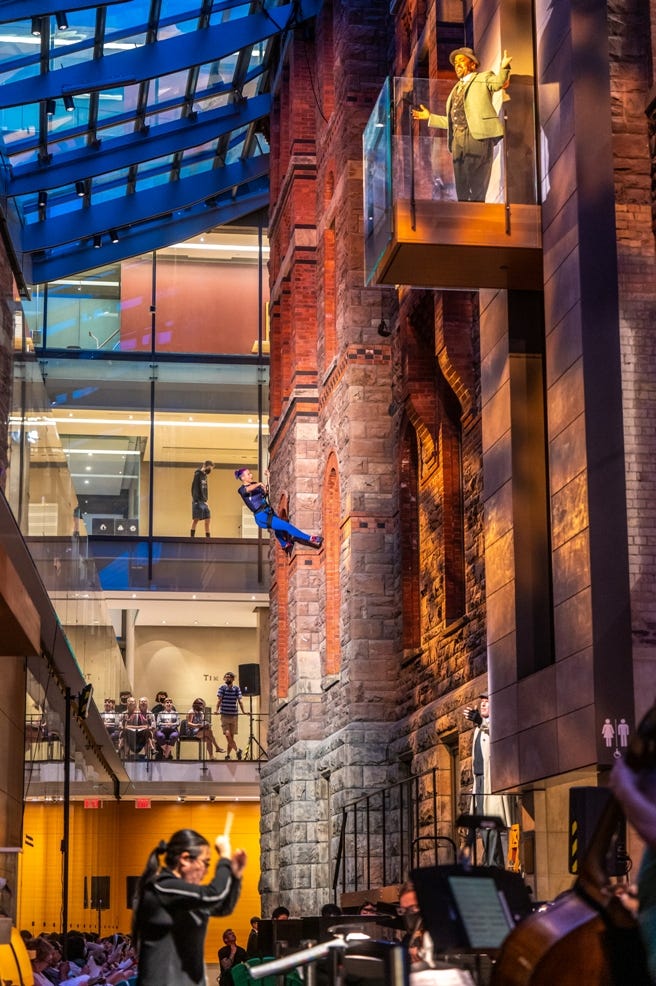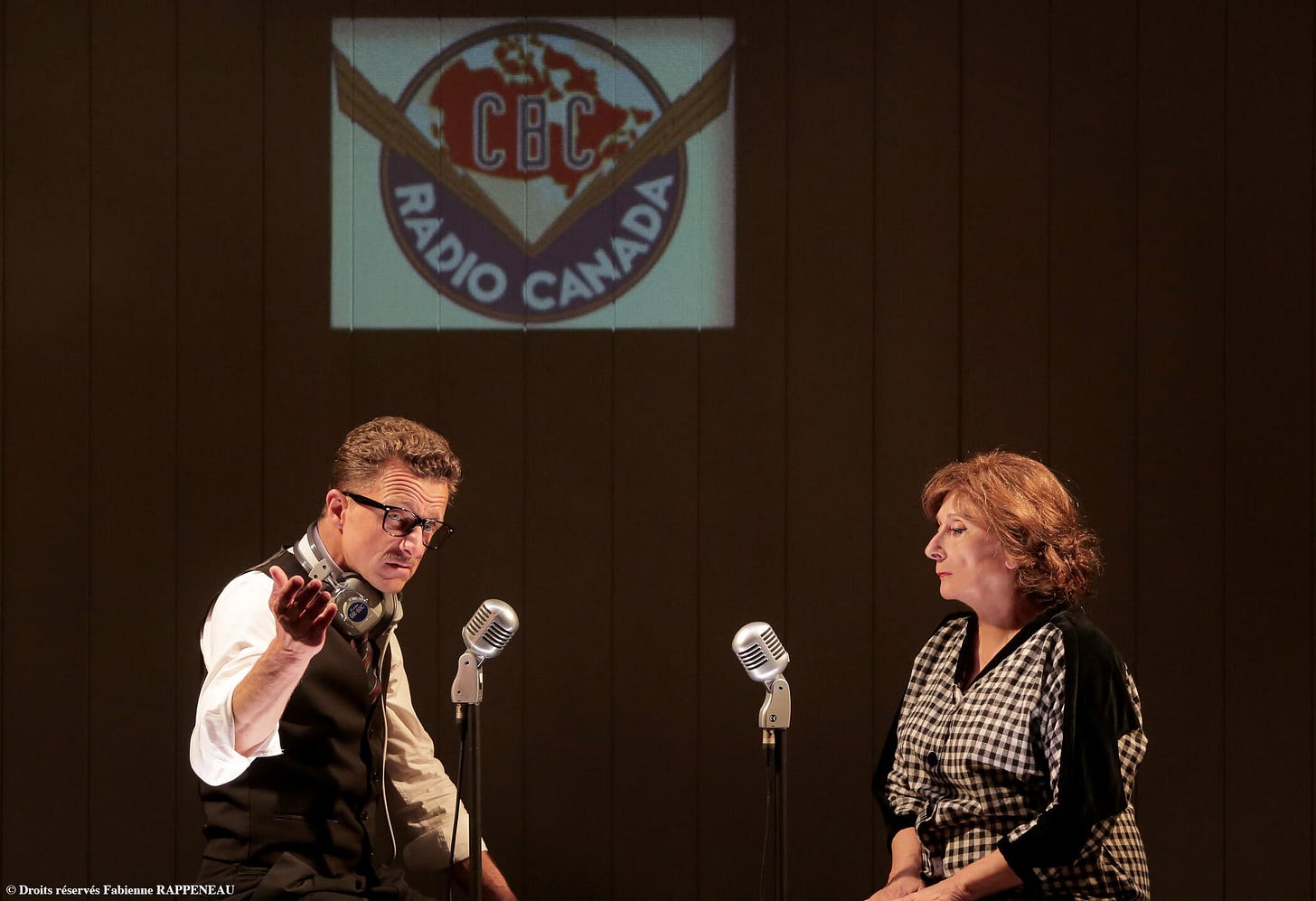You wouldn’t know by following Canadian media that it’ll be forty round years in October since Glenn Gould died. It’s France that’s been carrying the torch for Gould this year. A new piece by the playwright Ivan Calbérac called Glenn, naissance d’un prodige premiered off Festival d’Avignon in Paris recently and will continue at the Petit Montparnasse in the fall. GG, writes critic Severine Garnier in her rave about the play in Classique mais pas has been, leaves no one indifferent [except, I might add, Canada these days]. “There are those who, like the philosopher Fabienne Brugère, can’t work without the ’55 Goldberg Variations playing in the background (which happens to be the best selling classical recording of all time). Then there are those, like the conductor Philippe Herreweghe, who can’t stand Glenn Gould because he has this ‘annoying tendency to elbow his way in between Bach and me’.” The play, she says, will be of interest to both sides because it looks at his life through an unexpected lens: his relationship with his—apparently, extremely smothering and controlling—mother.
Pictures by Fabienne Rappeneau are from https://www.theatredesbeliersparisiens.com/spectacle/glenn-naissance-dun-prodige/
Over on France Musique, a new radio series on Glenn Gould this July and August, in 8 one-hour episodes. They seem to have read every book on GG available in English and in French for the doc.
Why have Canada’s theatre and narrative TV never dramatized Gould’s personal life? (And yes I am ignoring this tedious and reverential experimental documentary.) Boh. Your answer is as good as mine. CanLit hasn’t used him either; best known fictional take on Gould is probably Thomas Bernhard’s Loser -- title refers to a pianist who goes to music school alongside Gould -- which turns Gould into a NYC-based musician. (Don’t even.)
It’s by sheer accident that the new chamber opera, Gould’s Wall (Aug 4 – 12, 2022), a joint endeavour between Tapestry Opera and the Royal Conservatory of Music, premiers on the fortieth anniversary of Gould’s death: the opera has been planned much earlier but then the last two years happened and here we are in the summer of ‘22.
I had great hopes for this work, most of which were dashed by a mindless production and the atrocious amplification of voices. There’s a good chamber opera in there somewhere. Not within this framework, though.
On paper, it all looks promising. A musician meeting and surmounting challenges meets Gould somewhere on her trajectory. They discuss life and art, we get some highlights from Glenn’s life that helped or hindered his creative output. I thought, what’s not to like. The obstacles to be transcended are represented by a wall: the literal RCM wall that faces the new glassy Telus Centre performing arts addendum, the atrium occupied in daytime by an espresso bar. Singer Lauren Pearl, as the female protagonist “Louise”, was to climb and descend the wall on ropes. This all sounded cool in promo copy.

But from the first few bars on, your ears will be in stress whether you’re relatively close to the loud speakers, as all of us on the balcony were, or downstairs in the Muskoka chairs. You opera-heads will know this, so feel free to skip ahead, but it’s worth repeating that opera is by its (physical!) constitution unamplified by artificial means – that is, amplified by the inhumanly developed operatic voices which project well in halls with thousands of seats and can dial down to intimate for the chamber opera and recital. If amplified, which occasionally happens when new works contain electronica or find themselves performed in hangars or include pre-recorded sound, the miked singing needs toning down to nonoperatic volume and articulation. Here we had overmiked voices alongside some very loud singing, an undermiked orchestra, and a staging with no discernible ideas. Guys: a wall does not equal a production concept. I get that Gould’s connection to the RCM was important – it’s where he got his ARCT diploma at 12 years of age etc. I get that the atrium is a pleasant place to be in in daytime – hell it’s where I recorded the majority of my interviews with musicians in the last ten years. But the wall and nothing but the wall production is, turns out, dreary and hard to watch both from upstairs and downstairs. I don’t think I can blame the director Philip Akin for this, because The Wall was probably in-built into the creation, for which the director was later found. I wish he had the leeway to say, nah, let’s scrap this literal wall nonsense and find a smart set designer.
The work consists of about 10 scenes, and starts with the conversation between Louise and Glenn. I realized immediately why we had all been given the printouts of the libretto (by Liza Balkan) which we had to return at the end: you can’t understand a single word sung and amplified for you. Again, Opera 101: these people are trained and trained and trained to learn how to articulate clearly yet seemingly naturally in extremely high or low registers. The mikes here totally squashed the articulation. Forget understanding the text as it was delivered to you: all of us read our librettos as the action, such as it was, took place on the wall across. It was like doing homework next to a loud stereo playing metal.
There’s a scene with a piano teacher who sings from the wall balcony – with his instructions to the two musicians, about playing and comportment -- and there’s of course a scene with Gould’s extremely stage mother offering her view on things. In another scene, the fans and the critics pop out of the wall windows for some gossip and reconnaissance (“Carnegie Hall… success.. but have you heard about the Brahms fiasco?!”). In another one, Gould himself gets to plead the case against live performance – “live concert will be dead by 2000 any way”. (He undershot, but only by 20 years, it seems.) I wish I could tell you more about the music in those scenes. I can’t; it was all just undifferentiated background noise under the loud voices, from where I sat.
In the scene in which Louse and Glenn are sharing their nightmares (Glenn’s involves a woman rejecting him) I made extra effort to focus on the downstairs orchestra and the music it was offering. It’s in the next, addiction act, the scene 8 I believe, that it struck me how good this opera could have been if they hadn’t smothered it. The text-sound-action alchemy that is unique to (good) opera appeared in brief moments. The text begins innocently enough between the two musicians – “Double double”, “white toast”, listing the weaknesses and the fuel – but soon turns to names of amphetamines, anti-anxiety meds, the stuff that Gould became addicted to. It’s here that you can finally hear what Brian Current’s music can do – the turmoil, the build-ups and drops, the rhythmical unpredictability, all symbiotic with and honouring the text to a t. This is also evident in the final scene of the opera which really could have been, as was intended, a scene of transcendence – a celebration of the getting through and getting on with the work (of making art) in spite all the personal and societal flaws and limitations. But the miked voices almost drowned every single ounce of life from this scene. Almost. What was left made me long for a recording of the music, with the voices balanced down hard.
The chamber orchestra tucked away on the ground floor, conducted by Jennifer Tung, includes four pianos and I don’t think there’s been a more wasted presence of the pianos in a score in recent memory.
The climbing, I’m sorry to say, I could take or leave. The oh factor is pretty much gone after the first scene; she just… climbs up and down, there’s not much else that can be done. Why not create a double, played by an actual acrobat, alongside the unamplified singing role on the ground, if climbing is unavoidable in this formula? Singers don’t do this kind of stuff particularly well, nor should they be expected to. An operatic singer on the ropes, with a fussy mechanism in need of constant control, added anxiety more than anything else. Kudos to Lauren Pearl for being game, though.
And to whoever revives this: just — step away from the wall. Forget about the wall. Throw away the mikes and the loudspeakers and let’s have this chamber opera stiff and straight up, no rocks.

August in other arts & pleasure
Erin Shields is always interesting. Her Queen Goneril, a rewriting of King Lear from the perspective of the daughters, opens at Soulpepper August 25 and runs to October in conjunction with King Lear with the same cast.
Katherine Ryan is touring Missus, with one stop in Toronto, tonight Aug 6, doors 18h. The Danforth Music Hall. She probably starts much later so you have some time.
You all know about Parkbus, right? The company that takes the city people who hate driving or don’t own cars (huge numbers of new Canadians go on these, I’ve noticed) out to scenic places around Ontario for day trips? I went to the Haute Goat farm with them the other weekend and a couple of years ago to the Elora Gorge. This trip to Silent Lake for a hike and swim day has been on my radar all summer but the last remaining August date is when I’ll be in Europe. I trust some of you will make good use of this.
They also run a free shuttle (well, TD-sponsored) to Rouge Park once a week which is usually booked up weeks ahead. There are programs organized by Parks Canada once you make it to Rouge, and the shuttle and the tours require separate coordination, but I’ll figure it out before the fall, I’m determined.
And a reminder that there’s an extensive swing and lindy hop scene in Toronto, with live music bands and/or DJs playing on weekends. Saturday Night Swing at St. Barnabas includes the beginner lesson, should you need one. You can also dance tango at various places around town, if that’s your bag. (It used to be mine when I was younger!)
I’m off to see Ali & Ava this week, because I’m a sucker for British cinema, the drearier the film looks, the better. I’ve recently watched Francis Lee’s God’s Own Country on DVD, and ugly-cried when the Romanian guest worker managed to show the dead-tired local farmer (also, as of recently, his lover) that Yorkshire is not all toil but, if you take a moment at sunrise to notice, fucking beautiful. You need immigrants to show you these things, you know?
Till next time!
L.P.




